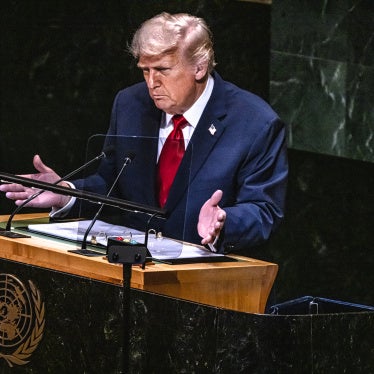Much legitimate criticism of the Council centers on its disappointing treatment of specific country situations. The problems are political, not institutional. The challenge is to develop the political will for this system to directly address abuses, rather than hold back criticism to avoid giving offense. There is a special need for engagement by the United States.
It took the former UN Commission on Human Rights more than twenty years after it was created in 1946 to move beyond formulation of human rights norms to the criticism of individual states for violating those norms, and it began with states—Chile, Israel and apartheid South Africa—that had relatively little political support in the international community. Yet over time the Commission came to scrutinize a broader range of states (although still not the most powerful), and developed an admirable system of “special procedures” (independent experts and working groups) to monitor human rights situations in specific countries and particular themes, for example, violence against women or arbitrary detention. The very success of the Commission in doing so led violator states to seek membership to protect themselves from criticism, and made it increasingly difficult to address serious violations.
In 2006, UN members voted 170 to 4 (with 3 abstentions) to replace the Commission with a new Human Rights Council. For the first time it was explicitly stated that Council members should themselves uphold the highest standards, and even the harshest critics agree fewer violator states have become Council members under the new election procedures. The new body meets throughout the year and is required to periodically examine all UN member states, even the most powerful. The Council’s founding resolution makes it potentially a stronger body than the former Commission, but civil society and democratic states, including the US, need to monitor and pressure Council members to fulfill their responsibilities to promote human rights. Thirty-nine of the 41 special procedures have been retained by the new body, but continued vigilance is required to ensure they survive further review.
Much legitimate criticism of the Council centers on its disappointing treatment of specific country situations. The problems are political, not institutional. One-sided international sympathy for the Palestinian cause and the organized efforts of Islamic states led the Council to address the inflamed Middle East conflict by repeated criticism of Israel, ignoring violations by Hezbollah and Palestinian factions. Resentment that most country-specific resolutions at the former Commission addressed developing nations, while powerful violator states often escaped criticism they deserved, has led to a general disinclination to adopt such resolutions, although the recent severe repression in Burma was directly addressed in a special session of the Council. The problem lies not with the UN as an institution or its Secretariat. The UN’s High Commissioner for Human Rights leads off each Council session with a statement citing many country-specific human rights situations that deserve the attention of the Council. The challenge is to build the political will for the Council members to effectively address such situations. The Council could employ a multi-level system that allows for differing situations to be treated differently, and provides for ratcheting up consideration of situations where improvements do not occur or there is a failure to cooperate.
The universal periodic review mechanism established for the new Council provides a new opportunity to hold all violator states to account. Beginning in 2008, the human rights records of all 192 UN members, starting with the Council members themselves and including the US, China, Russia, and other powerful states, will be examined by the Council over a period of four years. The challenge is to develop the political will for this system to directly address abuses, rather than hold back criticism to avoid giving offense. Now is not the time for supporters of human rights to disregard the Council, but rather for civil society around the world, and governments that support human rights, to mobilize the political and diplomatic pressure on Council members needed to make the adequate institutional arrangements produce effective results.
There is a special need for engagement by the United States, a traditional advocate for human rights globally, now discredited by some of its counterterrorism policies. The US opposed the resolution establishing the Council and has remained substantially estranged from it. Congress recently sent the wrong signal by voting to symbolically “withhold” a portion of UN dues applicable to the Council. Yet where it applies its diplomatic strength, the US has shown it can help produce useful results, as when it joined in defeating the candidacy of Belarus for the Council and supported the resolution against repression in Burma. Restoring US credibility by closing Guantanamo and renouncing waterboarding and other forms of torture would make it easier for the US to win election and resume its traditional leadership.
Despite problems both inherent in an intergovernmental body and those particular to difficult current politics, the Human Rights Council continues to have great potential as a force to improve human rights protection. The next few years call for greatly increased political and diplomatic effort by both civil society and governments to make the new Council procedures work effectively.
Lawrence Moss is special counsel at Human Rights Watch






